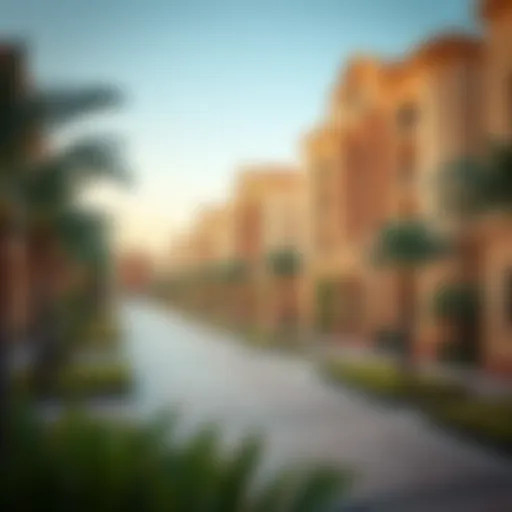Explore Dubai's Zones: Investment and Lifestyle Insights


Intro
Dubai has carved a unique niche in the real estate world, transforming from a modest trading port to a global hub for business, tourism, and innovation. This shift has birthed various dynamic zones, each with its distinct flair and investment potential. Understanding these zones can provide real estate investors, homeowners, and industry professionals with a clearer lens to navigate Dubai's ever-evolving property market.
Each area in this vibrant city offers an array of features and lifestyle benefits, tailored to different demographics and investment goals. Whether one is seeking opulent villas by the beach, sleek skyscrapers in the business district, or modest yet comfortable apartments, Dubai’s diverse zones cater to a myriad of needs.
As we delve into this article, we will explore the current trends shaping the market, forecasts that point toward future opportunities, and the varied property types available, complete with insights that can guide property-related decisions. The aim is to furnish you with a holistic understanding of Dubai's unique neighborhoods, ensuring you are well-equipped for your next investment venture.
Market Trends
Current Real Estate Trends in Dubai
Dubai’s real estate market has exhibited remarkable resilience, especially in the wake of global economic fluctuations. One of the notable trends has been the rise in demand for luxury properties, fueled by affluent expatriates and investors seeking second homes in this sun-kissed metropolis. Recent statistics indicate that luxury home transactions have increased significantly, with prime areas like Palm Jumeirah and Downtown Dubai witnessing spikes in property values.
On the other hand, mid-range properties are equally appealing, especially for first-time buyers and those looking to rent. This segment of the market has seen a healthy turnover, supported by government incentives and a relatively stable rental yield. Investors are particularly keen on areas like Jumeirah Village Circle and Dubai Marina, which offer a blend of affordability and accessibility.
Moreover, Dubai's real estate framework has evolved with initiatives like the introduction of 10-year residency visas for investors, which seamlessly attract foreign capital and boost market confidence.
Future Forecasts for the Dubai Property Market
Looking into the future, the Dubai property market seems poised for substantial growth. Analysts predict a steady increase in prices over the next few years, driven by infrastructural developments and the ongoing Expo 2020, which has showcased Dubai's potential as a global city.
With projects like Dubai Creek Harbour and the upcoming Dubai Square, the metropolitan landscape will likely undergo significant changes, attracting more investors and residents alike.
Some key forecasts include:
- An anticipated growth rate of 5% annually over the next five years.
- Increased foreign investment, courtesy of favorable regulations.
- The ongoing demand for residential and commercial spaces led by a growing population and a bustling tourism sector.
It's essential for investors and homeowners to stay abreast of these trends, as they can significantly influence market dynamics and investment decisions.
Property Types
Residential Properties: Overview and Insights
Residential properties in Dubai range from luxurious villas and high-end apartments to more modest townhouses. The diversity ensures that there is something for everyone. Many residents gravitate towards gated communities for their safety and communal amenities. Communities like Arabian Ranches and Emirates Living are particularly sought after for their family-friendly setups and lush surroundings.
The rental market also presents lucrative opportunities. With a rising number of expatriates, there's a steady demand for quality rental units, especially in areas close to business districts and leisure spots.
Commercial Properties: Opportunities and Challenges
The commercial property landscape is equally dynamic, offering a plethora of options for businesses. From state-of-the-art office spaces in Dubai Internet City to retail outlets in major malls like The Dubai Mall, the commercial sector remains vibrant.
However, challenges persist; fluctuations in global economies can impact occupancy rates. Companies often seek flexible leasing arrangements, which has led to the rise in demand for co-working spaces.
In summary, while Dubai's dynamic zones present numerous opportunities, understanding the intricacies of each area and staying informed about market trends is vital for making informed investment choices.
For further insights, you may find these resources helpful:
Preamble to Dubai's Real Estate Landscape
The real estate scene in Dubai is more than just another sector of the economy; it's a backbone that supports the vibrancy and growth of this dynamic city. Understanding the importance of this landscape is crucial for anyone who’s looking at the potential for investment, property ownership, or just navigating the intricate market. Dubai's real estate is a mix of glitzy skyscrapers, luxurious villas, and burgeoning communities that have captivated buyers from all walks of life.
Real estate in Dubai has evolved dramatically over the decades, transitioning from traditional sandy plots to an impressive collection of high-rises and residential neighborhoods. Each zone within the city possesses its own character and appeal, serving various lifestyles and preferences. This diversity allows investors to explore a range of options, whether they are seeking a high-return investment or a serene family home.
It's important to consider the various factors that influence the market, from economic stability to cultural shifts. With the continuous influx of expatriates and tourists alike, the demand for property in Dubai remains robust, marking it as a globally recognized hub for real estate investment.
Moreover, the local government initiatives aimed at enhancing the city's infrastructure and lifestyle amenities have made Dubai a sought-after destination.
“Dubai's real estate market epitomizes innovation and resilience, standing as a testament to a city's ability to adapt and thrive amid changing global dynamics.”
As we delve into the historical context of this development, we set the stage for understanding current trends in real estate investment, which reflect the city's ambition for future growth.
Understanding the Concept of Zones
Understanding the different zones within a city like Dubai is not just a walk in the park; it’s a dive into a rich tapestry of real estate opportunities, cultural nuances, and urban sustainability. As Dubai continues to evolve, its zones become pivotal not only in defining its landscape but also in determining property values, investment desirability, and lifestyle offerings. For investors, homebuyers, and industry professionals, grasping this concept is vital for making informed decisions in a rapidly changing market.
Defining Zones in Urban Planning
In urban planning, the term 'zone' generally refers to areas designated for specific purposes, like residential, commercial, or industrial use. These designations help maintain order and functionality within a city. For instance, neighborhoods like Downtown Dubai thrive on a blend of business and leisure, housing buzzing offices alongside luxurious shopping venues. Conversely, areas such as Dubai Marina focus on residential units and waterfront leisure.
To better illustrate this:
- Mixed-use zones: These amalgamate various facets of urban life, combining residential, commercial, and recreational spaces into one dynamic area.
- Residential zones: Areas designated primarily for housing, often emphasizing community and accessibility. An example is Jumeirah, known for its upscale villas and proximity to beaches.
- Commercial zones: Regions strictly for business activities, promoting economic activities. The Dubai International Financial Centre (DIFC) exemplifies this, offering a robust financial ecosystem.
Understanding these definitions aids in comprehending how Dubai’s real estate operates. The zoning principles set parameters that directly impact property developments, potential returns, and the lifestyle experience in each area.
Importance of Zones in Real Estate
The significance of zones cannot be overstated when it comes to real estate. Proper zoning profoundly influences property values, market demand, and investment potential. Investors shouldn't just see a piece of land; they should visualize its economic and social context.
For example, an area designated for mixed use has high appeal due to its diverse functionality, often leading to increased property values and more significant investment opportunities. In contrast, purchasing a property in a purely residential zone could yield less financial return, despite the charm and community aspects it may offer.
Key Takeaway: Understanding zoning helps investors and buyers assess the long-term viability of their investment, thus avoiding common pitfalls in property purchases.
Moreover, zones play a critical role in planning for urban infrastructure. As Dubai builds towards its future, the concept of sustainable living becomes more crucial. Mixed-use developments help reduce the need for extensive commuting, ultimately leading to lower carbon footprints. Locations like Dubai Design District are excellent examples, as they promote creativity, innovation, and environmental awareness—all through strategic zone planning.
In summary, zones are not mere geographical lines drawn on a map; they represent an intricate network of economic and cultural dynamics shaping the living experience in Dubai. Knowing how these zones function can empower investors and homeowners to make wiser, well-informed choices.


Key Areas to Consider: An Overview
When diving into Dubai's real estate landscape, understanding the key areas is akin to navigating a treasure map where each X marks not just a spot, but a uniquely vibrant zone full of potential. These designated zones are not merely geographic labels; they represent distinct lifestyles, investment opportunities, and market dynamics that dictate property values and desirability. Factors such as cultural significance, accessibility, and infrastructure development all contribute to the vital considerations that investors and homebuyers must weave into their decision-making processes.
Sections like Dubai Marina, Downtown Dubai, and Palm Jumeirah offer perspectives that go beyond numbers. They encapsulate the essence of what makes Dubai a magnet for real estate investment. Each area carries its character and charm, translating to various advantages and strategic opportunities for stakeholders. Let’s delve into each of these areas, exploring their unique attributes while shedding light on why they are pivotal for anyone looking to invest in this ever-evolving metropolis.
Dubai Marina
Dubai Marina stands out like a shining pearl amidst Dubai's vast architectural wonders. Characterized by its waterfront living, luxurious skyscrapers, and an endless promenade that draws residents and visitors alike, this area is more than just housing; it's a lifestyle choice.
- Investment Potential: High demand for rentals owing to its attractiveness to expatriates and tourists.
- Lifestyle Benefits: Close proximity to stunning marina views, upscale shopping malls, and world-class dining.
People flock to Dubai Marina for its vibrant nightlife, boating opportunities, and the sheer beauty of its surroundings. Property values here tend to stay buoyant, making it a reliable choice for those with a keen eye for investment. As the area continues to develop, one can only anticipate further appreciation.
Downtown Dubai
Downtown Dubai is the heartbeat of urban luxury. With iconic landmarks such as the Burj Khalifa and the Dubai Mall, it exudes grandeur and sophistication.
- Cultural Attractions: The Dubai Fountain and rich array of art installations nourish the cultural landscape.
- Market Dynamics: A hub for high-end retail and dining experiences that draw both locals and tourists.
The buzz in Downtown Dubai is palpable, with every corner showcasing the fusion of modern architecture and rich heritage. This zone's desirability often results in a strong rental market, especially for those seeking a unique blend of work and leisure—the very definition of metropolitan living.
Palm Jumeirah
One cannot discuss Dubai's key areas without mentioning Palm Jumeirah. This engineering marvel, shaped like a palm tree, is not just a residential area; it’s an emblem of luxury living.
- Luxury Estates: Exclusive villas and high-end condos that cater to a wealthy clientele.
- Recreational Facilities: Gorgeous beaches and premier hotels add to its allure.
Owning property in Palm Jumeirah is akin to securing a piece of paradise. With its high-profile neighbors and exclusive ambience, it maintains a strong appeal to investors looking for long-term value. The palm’s unique location also offers unobstructed sea views, making it a coveted property for many.
Each of these areas presents a unique narrative full of insights that guide real estate decisions within Dubai’s vibrant context. By understanding these key areas, investors can better position themselves, ensuring they make informed choices driven by both current trends and future growth potential.
Emerging Zones: Growth and Investment Opportunities
Emerging zones in Dubai present a unique canvas for growth and investment, critical to understanding the constantly shifting landscape of the city's real estate market. These areas are more than just geographical locations; they are burgeoning hotspots where innovative developments, commercial activities, and lifestyle amenities converge. For investors, recognizing the promise embedded within these zones can offer a tactical advantage, driving lucrative opportunities that could yield significant returns.
Dubai South
Dubai South is rapidly transforming into a key regional development, strategically located near the Al Maktoum International Airport. This zone is designed as a city within a city, encapsulating both residential and commercial elements in a purposefully planned environment. It aims to accommodate 1 million residents and is poised to attract significant investment from various sectors.
- The vision for Dubai South serves multiple purposes, notably aimed at enhancing connectivity and fostering economic diversification. With projects like the Expo 2020 site now integrated into its fabric, this zone stands as a beacon for future growth.
- Accessibility is a major factor here. With the expansion of transport systems leading to the airport and other key zones, significant infrastructures such as roads and public transport will enhance movement and encourage business engagements.
"Dubai South offers a rare opportunity, combining commercial benefits and residential satisfaction under one overarching development plan, making it a prime choice for investors."
Dubai Design District
The Dubai Design District (d3) is another rising star in the realm of Dubai’s emerging zones. Curated with the creative industries in mind, this area represents a melting pot for artists, designers, and innovators. It’s not merely about aesthetic appeal but forming a vibrant community that gels creativity with commerce.
- The d3 initiative represents a deliberate effort to broaden the economy through the promotion of design and innovation sectors. Several annual events, such as Abu Dhabi Art and Dubai Design Week, draw international attention, thereby elevating the profile of the zone.
- Additionally, the infrastructure is crafted not just for functionality but for sheer experience. Life in d3 is enhanced by a range of facilities, from art galleries to boutique shops, which complement the wholesale and retail spaces often sought after by savvy investors.
Factors Influencing Property Value in Different Zones
Understanding the factors that affect property values in Dubai's various zones is essential for anyone looking to invest in real estate. Whether you're a seasoned investor or a newcomer to the market, recognizing how these elements intertwine can guide your decisions and optimize your investment potential. The property landscape in Dubai is dynamic, influenced by a multitude of aspects that can either drive prices up or cause them to dip.
Location and Accessibility
Location remains one of the paramount factors in determining property value. In the bustling city of Dubai, proximity to prominent landmarks, business hubs, and transport networks can make all the difference. For instance, properties closer to Dubai Marina or Downtown Dubai are typically more sought after due to their accessibility and vibrant lifestyle. Areas with easy access to public transport, such as the Dubai Metro, considerably enhance property desirability. Improved connectivity can elevate property value since buyers and renters often seek convenience in commuting.
- Proximity to Amenities: Nearby facilities like schools, hospitals, and shopping centers play a significant role. Potential buyers prioritize areas that offer a holistic lifestyle experience.
- Developing Areas: Properties in developing zones, like Dubai South, may initially be lower in price but can appreciate significantly as infrastructure improves and demand rises.
Infrastructure and Amenities
Investors should consider the quality of infrastructure when evaluating property value. Well-developed infrastructural projects, such as roads, utilities, and public spaces, not only enhance livability but also boost property prices. Additionally, the availability of amenities greatly affects market perception. Properties located near parks, gyms, and recreational facilities often attract higher demand.
Investments in infrastructure have a direct correlation with property prices; better amenities usually lead to higher appreciation.
- Smart City Initiatives: Dubai's commitment to technology integration—like smart homes and energy-efficient utilities—can elevate property values substantially.
- Community Developments: Gated communities with exclusive amenities often command a premium, attracting affluent buyers who seek security and community.
Market Demands and Trends
The ever-evolving demands of the real estate market influence property value as much as location and infrastructure. Investors must keep an ear to the ground for market trends that impact buyer preferences. For example, there's been a growing inclination towards properties that offer sustainability and eco-friendly features. Buyers are increasingly interested in energy-efficient homes that promise lower utility bills and contribute to environmental conservation.
- Shifts in Demographics: Young professionals may prefer luxury apartments in urban areas, while families might seek larger homes in quieter neighborhoods. Tracking these trends can help predict which areas will see rising values.
- Economic Factors: The overall economic climate, including employment rates and the influx of expatriates, affects demand. In a booming economy, property values tend to rise as more individuals seek accommodation.
Living in Dubai: Lifestyle Considerations for Investors
When evaluating real estate investment prospects in Dubai, understanding the lifestyle it offers is as vital as the numbers. For investors, homeowners, and those contemplating relocating, the everyday experience in Dubai can significantly affect property value and desirability. The urban tapestry of Dubai is woven with diverse cultural experiences, lifestyle amenities, and recreational options that cater to a wide audience.
Cultural Attractions
One cannot overlook the rich cultural landscape that Dubai presents. The city is not just a hub for business; it also boasts a vibrant cultural scene. Museums like the Louvre Abu Dhabi and the Dubai Museum showcase the historical evolution and artistic merit of the region. Events such as Art Dubai and the Dubai International Film Festival highlight the city’s commitment to promoting art and culture. This dynamism attracts individuals who prioritize cultural engagement, thereby influencing property choices.
For investors, properties near cultural hotspots are likely to experience higher demand. Consider areas like Al Quoz and the Dubai Design District, where art galleries and exhibitions thrive. Living within steps of cultural hubs ensures a lifestyle immersed in creativity and diversity, appealing to both expatriates and locals alike.
Moreover, community events such as the Dubai Shopping Festival not only highlight commercial offerings but also bring people together, strengthening community ties. The joy of participating in celebrations centered around culture and heritage cannot be overstated; it significantly contributes to the quality of life that modern investors seek.
Leisure and Recreational Facilities
Dubai excels in offering a plethora of recreational and leisure facilities designed to enhance quality of life. Whether you’re seeking world-class yacht clubs, expansive parks, or high-end shopping malls, there’s something for everyone.


The Dubai Marina is a prime example, where luxurious amenities intertwine with stunning waterfront views. Here, property buyers have access to activities such as sailing, jogging along the promenade, or dining in fine restaurants. Parks like Zabeel Park and Safa Park serve as green lungs in the city, offering residents a retreat from the hustle and bustle.
When it comes to shopping, The Dubai Mall stands out, housing not just shops but attractions like an aquarium and an ice rink, making it a prime hangout spot.
Investors should consider properties near these recreational facilities as they are likely to enhance lifestyle appeal and subsequently lead to higher property valuation. Many families and individuals today prioritize their well-being and leisure, and having entertainment and relaxation options nearby significantly influences their choice of residence.
In summary, the lifestyle offerings in Dubai—whether cultural or recreational—play a pivotal role in influencing property investment decisions. Understanding these aspects is crucial for making informed choices in this dynamic market.
Legal Considerations in Dubai's Real Estate Market
Navigating the real estate market in Dubai is not just about finding the right property or understanding the market trends. Legal considerations play a monumental role in ensuring that investors and homeowners alike make informed decisions that are protected legally. The framework here is distinct, influenced by both local customs and international practices. Understanding the legalities involved can be crucial for anyone looking to dip their toes into this vibrant market.
Understanding Freehold vs. Leasehold
When it comes to property ownership in Dubai, one of the first hurdles that buyers encounter is the distinction between freehold and leasehold properties. Freehold ownership allows for complete ownership of the property and the land it sits on; this often attracts many foreign investors. Imagine owning a slice of paradise without a landlord dictating terms. On the other hand, leasehold properties allow buyers to own the property for a set duration, generally 99 years, but the land remains the ownership of the leaseholder.
The benefits of freehold ownership are clear; not only does it provide more security for the investment, but it also tends to appreciate faster due to the perceived value of owning land outright. For instance, areas like Dubai Marina and Downtown Dubai offer freehold options that boast luxurious amenities, making them highly sought after.
Considerations include:
- Investment Security: Freehold properties typically provide more peace of mind.
- Market Value: Generally, freehold properties fetch a higher resale value.
- Duration of Ownership: Leasehold could lead to future uncertainties.
When deciding between the two, it’s essential for investors to consider their financial goals, the intended length of property use, and the potential return on investment.
Regulatory Framework and Compliance
Dubai’s real estate sector operates under a stringent regulatory framework set forth by the government. This framework includes specific laws and regulations that govern property transactions, ownership rights, and the responsibilities of various stakeholders, including developers, agents, and owners. Keeping abreast of these regulations is not just necessary; it’s imperative for anyone engaging in the property market.
The Real Estate Regulatory Agency (RERA) plays a pivotal role in overseeing compliance with these regulations, ensuring that all parties involved adhere to the law. This agency establishes guidelines for how properties should be marketed and sold and sets out the standards for both developers and agents in Dubai.
"Staying informed about changes in legislation not only safeguards your investment but also empowers you as a buyer or seller in the market."
Investors must be especially cautious about the following:
- Registration Fees: Knowing the costs involved in registering properties will save headaches down the line.
- Sales Contracts: These must be comprehensively reviewed to avoid loopholes.
- Off-Plan Purchases: Investing in properties that are under construction has its legal implications, and understanding this can prevent future complications.
This understanding of the legal landscape, particularly surrounding ownership types and compliance requirements, not only protects investments but also enhances peace of mind when venturing into the dynamic real estate market in Dubai.
For more detailed regulations, you may refer to official resources such as RERA, which provides insights directly related to the laws governing the real estate market in this bustling city.
Financing Options for Property Buyers
The landscape of Dubai’s real estate market is not only shaped by its iconic skyline and luxurious developments but also by the financing options available for buyers. Understanding these options is crucial as they can directly influence property decisions and investment strategies. Buyers need to grasp the nuances of financing to navigate the often complex terrain of property ownership in a city renowned for its rapid economic growth and diverse real estate offerings.
Mortgages and Loans
When considering purchasing property in Dubai, securing a mortgage or loan is frequently part of the equation. Mortgages in the UAE typically offer several attractive features which can make ownership more accessible for foreign investors and locals alike. Here are some key points to keep in mind:
- Variety of Loan Options: Financial institutions in Dubai provide a wide range of mortgage products, including fixed-rate mortgages and variable-rate loans. This diversity allows potential buyers to choose an option that aligns with their financial situation.
- Foreign Buyer Eligibility: Unlike many other countries, foreign buyers can obtain mortgages in Dubai. This opportunity often leads to increased interest from international investors looking to take advantage of the emirate's thriving property market.
- Loan-to-Value Ratios: Typically, banks in Dubai offer up to 80% loan-to-value ratio for UAE nationals and 75% for expatriates. This allows buyers to make a smaller down payment. However, understanding the requirement norms is crucial before embarking on the purchasing journey.
- Documentation Requirements: To apply for a mortgage, prospective buyers will need to gather essential documents such as proof of income, residency permits, property details, and bank statements. It is wise to have these on hand to streamline the process.
In summary, exploring the right mortgage options can significantly impact the financial viability of the real estate investment. A well-informed approach to financing helps investors make prudent decisions that align with their goals.
Investment Schemes and Offers
Apart from traditional mortgages, various investment schemes and offers add a layer of flexibility to property ownership in Dubai. These initiatives are particularly appealing to a broad spectrum of investors, from seasoned real estate professionals to first-time buyers. Here are some prevalent financing schemes:
- Off-Plan Developments: Many developers in Dubai offer attractive payment plans for off-plan properties, allowing buyers to pay in installments over the construction period. This scheme means less upfront cost and can yield substantial returns upon completion.
- Rent-to-Own Options: Rent-to-own schemes are gaining popularity, enabling buyers to rent a property with the option to purchase it after a predetermined period. This can be a less risky way for first-time investors to step into the market, as they can evaluate the property before committing.
- Developer Financing: Some real estate developers provide their own finance solutions which can be more lenient compared to traditional banks. This can particularly benefit buyers during promotional periods.
- Government Initiatives: The UAE government has implemented various programs to stimulate investor interest, including reduced fees and schemes designed to support home buyers. Staying updated on such initiatives can also lead to more economical choices.
Navigating these financing options requires careful consideration and consultation with financial advisors to ensure that the choices made align with investment goals. Adopting a thorough understanding of available schemes and their implications can enhance an investor's ability to thrive in Dubai’s vibrant real estate market.
"Knowledge of financing options serves as a gateway to successful property investment in Dubai's dynamic market."
Grasping the financial aspect of real estate transactions can be the linchpin of making sound investment decisions. With options as varied as the properties themselves, buyers should engage with local agents and financial experts to tailor their financing strategies to their unique situations.
The Role of Real Estate Agents
When navigating the intricate landscape of Dubai's real estate market, the significance of real estate agents cannot be overstated. They act as intermediaries, bridging the gap between buyers and sellers, while also offering a treasure trove of insights and information essential for making informed decisions. The fast-paced nature of Dubai's property scene, combined with its unique market dynamics, highlights the indispensable role that agents play.
Choosing the Right Agent
Selecting an agent isn't just about flipping through listings or relying on happenstance. It’s a crucial decision that can greatly affect the success of any transaction. When searching for the right real estate agent, consider the following elements:
- Experience in the Local Market: Each zone, be it Dubai Marina or Downtown Dubai, has its own flavor and idiosyncrasies. An agent familiar with these areas can provide tailored advice and insights based on local trends.
- Reputation and Referrals: Personal recommendations from friends, family, or colleagues may pave the way to finding a reliable agent. Checking online reviews can also reveal valuable insights about an agent's professionalism.
- Strategic Approach: A proficient agent should not only showcase properties but also offer a strategic plan for achieving your specific goals, whether purchasing, selling, or investing.
- Communication Skills: Effective communication is pivotal. An agent should be accessible, responsive, and able to explain complex matters in a clear, comprehensible manner.
By thoughtfully considering these aspects, investors and homebuyers can set themselves up for successful transactions, avoiding landmines along the way.
Agent Responsibilities and Services
The duties of real estate agents extend well beyond merely showing properties. Here’s a look at some critical responsibilities they hold:
- Market Analysis: Agents provide up-to-date information on property values, helping clients understand the current market status. They analyze comparative properties and recent sales to inform pricing strategies.
- Negotiation: Negotiating the best price and terms is fundamental. Well-versed agents are trained negotiators who can advocate for their client’s interests, ensuring the best possible deal.
- Paperwork and Compliance: Navigating legal requirements can be overwhelming. Agents assist clients by handling necessary paperwork, ensuring compliance with regulations, and mitigating potential legal issues.
- Networking: Real estate agents often have extensive networks. They can connect clients with legal advisors, home inspectors, mortgage brokers, and more, thus making the process smoother and more efficient.
"A good agent is your pillion rider on the rollercoaster of real estate, guiding you through twists and turns with expertise."
In sum, real estate agents serve as pivotal allies in the daunting journey of property transactions. Their combination of expertise, local knowledge, and robust networks can make all the difference in navigating Dubai’s multifaceted zones. Understanding the benefits of hiring a competent agent can lead investors and homebuyers to make well-informed choices in this lucrative market.
Market Analysis and Predictive Trends
Market analysis and predictive trends play a critical role in understanding Dubai's real estate market. By examining past performance and anticipating future developments, investors, homebuyers, agents, analysts, and developers can better navigate this dynamic zone. The real estate landscape in Dubai is notably fluid, influenced by a myriad of factors, including shifts in consumer behavior, governmental policies, and international economic conditions.


A well-rounded market analysis consists of several essential elements:
- Historical Data: This includes previous property sales figures, rental rates, and market demand patterns that help establish a baseline for projections.
- Current Trends: Keeping an eye on what’s popular or emerging in the market can signal where to invest next. For instance, luxury apartments versus affordable housing may depict which segments are currently thriving.
- Predictive Modeling: Some investors utilize advanced analytics to forecast future market movements based on historical trends and present-day metrics.
The benefits of conducting thorough market analysis are numerous. For investors, it enables the identification of prime investment opportunities, which ultimately lead to favorable returns. Homebuyers can make informed decisions about where to purchase property, ensuring that they invest in a growing, livable area.
In light of everything discussed, it becomes clear that keeping a finger on the pulse of the Dubai property market is not merely beneficial, but necessary for anyone engaged in real estate.
Past Performance and Future Forecast
Tracking past performance often serves as the litmus test for future predictions in real estate. Observing previously successful areas like Downtown Dubai, which has consistently shown remarkable appreciation over the years, helps to identify characteristics of lucrative zones. For instance, the proximity to transport links and employment hubs has frequently driven demand in these regions. Keeping historical price movements in mind is crucial; if a neighborhood has a strong upward trend over a decade, its future prospects appear brighter.
"To invest wisely, one must not only look where the market has been but anticipate where it is headed."
Thus far, the forecast for Dubai's market is predominantly optimistic. Expectation centers on continued growth in both residential and commercial properties, spurred in part by major infrastructure projects like the Expo 2020 site transforming into a large-scale mixed-use development post-event.
Impact of Global Economic Factors
The global economic environment inevitably exerts a significant influence on Dubai's real estate landscape. External factors such as geopolitical tensions, fluctuations in oil prices, and shifts in foreign investment can radically alter the market. For example, when oil prices dip, investors from oil-dependent economies may restrict their spending, thus impacting property prices in Dubai.
Furthermore, the trajectory of interest rates globally shapes local market behaviors. A rise in global interest might lead to higher borrowing costs, consequently dampening property demand. Similarly, currency valuations, especially that of the UAE Dirham against major currencies, can affect the attractiveness of properties to foreign buyers. Hence, remaining cognizant of these global shifts is paramount for anyone invested or interested in Dubai’s property market.
In summary, the significance of market analysis and the foresight into predictive trends cannot be understated in the context of Dubai’s dynamic real estate zones. By leveraging past performance metrics and understanding global economic influences, stakeholders are better equipped to make informed decisions that align with their goals.
Navigating Property Ownership: A Guide
Understanding how to navigate property ownership in Dubai is paramount for anyone considering investing in this dynamic market. It is not just about purchasing property; it is about grasping the intricate processes that come along with it. As an investor or future homeowner, you need to familiarize yourself with key elements that ensure a smooth transaction and beneficial ownership experience.
Documentation and Paperwork
When it comes to property ownership, documentation is king. Dubai has specific regulations that can affect both local and expatriate buyers. Therefore, gathering the correct paperwork can feel like jumping through hoops, but it is non-negotiable. Here are key documents you should have:
- Property Title Deed: This proves your ownership right and is usually issued by the Dubai Land Department.
- No Objection Certificate (NOC): Needed from the developer if you're buying a property that is under development or subject to service charges. This certifies that you owe nothing to the developer.
- Sale and Purchase Agreement (SPA): A vital contract that encapsulates the terms of the sale. Ensure it's reviewed by a legal expert to protect your interests.
- Identification Documents: Whether you're a UAE national or a foreign investor, you will need to provide ID proofs, such as a passport or Emirates ID.
Navigating these documents often requires the expertise of professionals like lawyers and real estate agents. Their insight can save you from potential pitfalls that may arise from missing paperwork or misunderstandings.
Post-Purchase Management
Once you've finalized your purchase, the journey doesn’t stop there. Effective post-purchase management is essential to protect your investment. Here’s what you should focus on:
- Maintenance and Property Management: Deciding whether to manage the property yourself or hire a management company is crucial. A professional service can handle tenants, maintenance, and issues you might not have time for, especially if you reside abroad.
- Legal Compliance: Stay informed about local laws that may affect the property. This includes property taxes, homeowners’ association rules, and regulations governing rental agreements, especially if you plan to lease part of your property.
- Insurance: Protecting your investment is key. Look into property insurance that covers damage or liability. This can provide peace of mind and shield you from unexpected expenses.
- Resale Considerations: Even if you're not planning to sell right away, keeping track of market fluctuations and comparable sales helps you stay informed about your asset's value.
By addressing these factors, you ensure that your investment doesn’t just sit idle but flourishes in Dubai’s competitive real estate landscape.
"Owning property is not just about having a place to sleep; it's about making a long-term financial investment that requires careful management and foresight."
In summary, navigating property ownership in Dubai requires diligence, organization, and often, a strong support network of professionals. With these considerations in mind, you are better equipped to make informed decisions that will enhance your property journey.
Sustainable Development in Dubai's Zones
Sustainable development is a hot-button issue, particularly in rapidly growing urban environments like Dubai. The importance of this topic cannot be overstated in the context of real estate and urban planning. As more people flock to this city of innovation, understanding how Dubai is integrating sustainability into its zones is crucial for investors, homebuyers, agents, and analysts.
The benefits of sustainable development touch upon various aspects:
- Environmental Responsibility: Implementing eco-friendly practices reduces the carbon footprint of new developments, aligning with global sustainability goals.
- Enhanced Property Value: Properties in zones that prioritize sustainability tend to attract premium prices. Buyers are increasingly looking for eco-conscious options.
- Community Well-being: Sustainable design promotes healthier living spaces, resulting in improved quality of life for residents.
- Regulatory Compliance: With strict guidelines from the Dubai government regarding sustainable practices, staying ahead in this area is essential for developers and investors.
As we navigate through this section, let’s delve into the eco-friendly initiatives taken within Dubai's zones, followed by the future trajectory of urban sustainability in the city.
Eco-friendly Initiatives
Dubai is making strides with a variety of eco-friendly initiatives aimed at reducing the overall environmental impact of urbanization. These initiatives include:
- Green Building Codes: The emirate has enforced codes that dictate energy efficiency standards in new constructions. The Estidama rating system, for instance, encourages sustainable building practices.
- Waste Management Programs: The city is actively working towards a circular economy. Initiatives like recycling and composting have been adopted to minimize waste.
- Public Transport Enhancements: Expanding public transportation options facilitates less reliance on personal vehicles, effectively lowering emissions. The Dubai Metro is a prime example of efficient public transport.
- Renewable Energy Projects: The Mohammed bin Rashid Al Maktoum Solar Park symbolizes Dubai's commitment to solar energy. Projects like this contribute to diversifying the energy mix.
The shift towards sustainability in Dubai is not just a trend; it's becoming the norm. Investors should factor this into their strategies as the demand for green properties rises.
These initiatives create a framework for developers and investors to follow, with the potential to set a benchmark in the real estate market.
Future of Urban Sustainability
Looking ahead, the future of urban sustainability in Dubai appears promising. Several elements will shape this environment:
- Smart City Initiatives: Technology will be paramount in the sustainability landscape. Smart systems can optimize energy consumption, monitor environmental impact, and even guide citizens towards greener choices.
- Adaptive Reuse of Structures: Instead of clear-cutting for new developments, utilizing existing structures through adaptive reuse will be vital. This method preserves cultural heritage while also being environmentally friendly.
- Innovative Green Infrastructure: Future projects are expected to incorporate green roofs, vertical gardens, and urban forests. These features not only beautify but also improve air quality.
- Community Engagement: Public involvement in sustainability programs is critical. Educating residents about conservation practices ensures long-term success in maintaining a sustainable city.
In light of these developments, investors should consider recalibrating their focus towards properties that are already implementing or will adopt sustainability measures. As the global conversation shifts increasingly towards sustainability, Dubai’s response could serve as a model for future urban centers.
For additional insights and resources on sustainable practices in urban development, check Wikipedia or engage with communities on platforms like Reddit to stay updated on trends and discussions.
The End and Future Outlook
In summarizing the landscape of Dubai's dynamic zones, it's clear that the real estate market here offers more than just property; it presents a mosaic of opportunities shaped by innovation and strategic growth. As Dubai continues to expand, the significance of understanding these zones cannot be overstated. Investors, homebuyers, and agents alike must be attuned to the evolving dynamics that dictate property values and lifestyle offerings. The thorough exploration of various areas within Dubai gives prospective investors a solid footing to make well-informed decisions.
Summary of Key Insights
Throughout this article, several critical insights have emerged. Each zone in Dubai showcases its own charm, culture, and potential for return on investment.
- Diversity of Options: From luxurious apartments in Dubai Marina to the upscale residences in Downtown Dubai, choices cater to a wide spectrum of investors.
- Emerging Opportunities: Areas like Dubai South and the Design District highlight the future direction of investment—berths for growth and prosperity await the astute investor.
- Cultural Integration: The rich cultural tapestry woven into the fabric of Dubai's neighborhoods adds intrinsic value to real estate. Areas with vibrant community life often see heightened demand, influencing market trends.
- Legal and Financial Considerations: Understanding the difference between freehold and leasehold properties, alongside financing options available, play a crucial role in enhancing an investor’s strategy.
"The smart investor is the one who sees beyond the present and prepares for the future."
Final Thoughts on Investment Potential
The potential for investment within Dubai's real estate market is vast and layered with various opportunities. As the city continues to redefine itself, the zones discussed represent not just geographical locations, but also prospects for synergy between lifestyle desires and investment strategies.
With ongoing infrastructural projects and a commitment to sustainability, Dubai is steering towards a progressive future. Investors who engage fully with the unique offerings of each zone will likely find rewarding returns.















